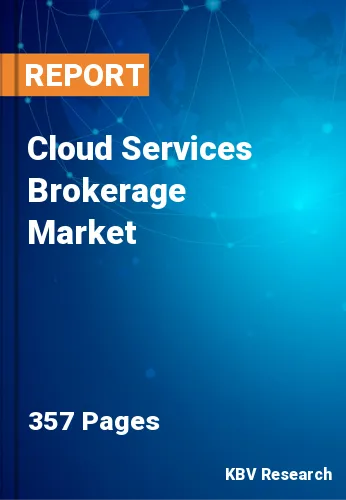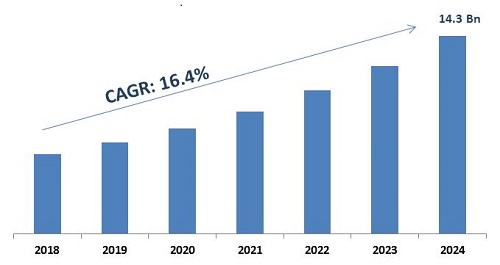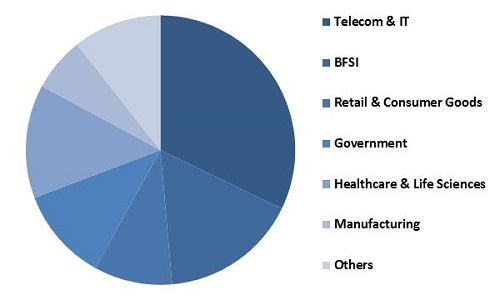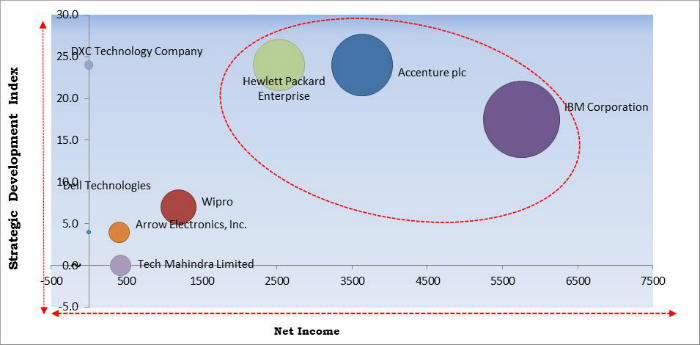
The Cloud Services Brokerage Market size is expected to reach $14.4 billion by 2024, rising at a market growth of 16.4% CAGR during the forecast period.
A cloud services broker intermediaries cloud providers with consumers and makes it possible for companies to choose cloud services and offerings that are appropriate to their requirements. The Cloud Services Brokerage (CSB) technology is capable of encompassing all cloud services within a single bill. In other words, by employing an effective CSB technology, a customer can manage various cloud service provider bills for different platforms like infrastructure-as-a-service (IaaS), platform-as-a-service (PaaS), and software-as-a-service (SaaS).
Global Cloud Services Brokerage Market Size

Based on Platform, the market is segmented into External Brokerage Enablement and Internal Brokerage Enablement. A CSB can combine all cloud services with one bill, i.e. a customer can manage cloud service provider bills for different IaaS, a platform as a service (PaaS) and a CSB platform. Internal CSB provides employees with a unified multi-cloud/SaaS management, security, compliance, license and support, spending management and overall user experience. Internal Brokerage has dominated the market during the forecast period.
Segment Highlights:
Based on Service Type, the market is segmented into Integration, Sourcing, & Procurement, Vendor Management, and Governance & Control. A cloud service integrator is technically highly qualified; this type of provider merges services from a variety of cloud providers to create a net-new business process. The value proposition of the Cloud Integrator is that it creates automated workflows based on cloud that are normally integrated by the customer - a prospect that many companies of any size care at this point themselves. Integration, Sourcing, & Procurement has dominated the market during the forecast period.
Based on Deployment model, the market is segmented into Public, Private, and Hybrid. The general public can access cloud services. The services may include a single tenant or a multi-tenant (single instance, application-based split). There are many locations providing services under many public cloud implementations and neither the location of service nor data are guaranteed. The Public model has dominated the market during the forecast period.
Based on End user, the market is segmented into Telecom & IT, BFSI, Retail & Consumer Goods, Government, Healthcare & Life Sciences, Manufacturing, and Others.
Cloud Services Brokerage Market Share By End User

Based on Organization size, the market is segmented into Large Enterprises, and Small & Medium-Sized Enterprises. Out of the aforementioned organization sizes segments, the large enterprises segment is projected to hold a larger market share. This larger market share accounts to the prominent advantages associated with CSB including single point of accountability and transparency. These advantages enable enterprises to switch between the various cloud models with greater convenience. Large scale enterprises that employ cloud brokerage and enabling solutions are capable of providing new services to their customers and can pave their horizons into budding markets.
Based on Regions, the market is segmented into North America, Europe, Asia Pacific, and Latin America, Middle East & Africa. Remarkable improvements and innovations in the CSB technology are likely to support the ruling position of North America among other regions across the global market.
The market research report covers the analysis of key stake holders of the market. Key companies profiled in the report include IBM Corporation, Dell technologies, Accenture Plc., Wipro, DXC technology, Arrow Electronics Inc., Tech Mahindra Ltd., ComputeNext Inc., Oracle Corporation, and HP Enterprise.
Competitive Scenario (KBV Cardinal Matrix): Cloud Services Brokerage Market

Market Segmentation:
By Platform
By Service Type
By Deployment Model
By Organization Size
By End User
By Geography
Companies Profiled
Our team of dedicated experts can provide you with attractive expansion opportunities for your business.
